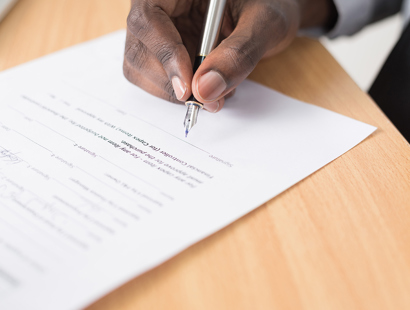Tips for executing a document as a deed during lockdown
While the country is currently in lockdown, documents and agreements may still need to be signed. Certain documents signed under the law of England and Wales are 'deeds'.
Some documents such as transfers of land either have to be signed as a deed, or have historically been signed as deeds. Some agreements entered into pre-lockdown, may require that collateral or ancillary documents are signed as deeds.
A deed is a signed document which satisfies certain requirements, the main ones being that the document is stated to be a deed and if it is signed by an individual, that it is signed by that person in front of a witness. Companies and limited liability partnerships (LLPs) can sign deeds either by a director or member in front of a witness or by two directors, a director and a company secretary, or two members (in the case of an LLP).
Given that deeds will often require a witness to the signature, this presents obvious problems in the context of a national lockdown (and practical difficulties can arise even in the best of times).
This article will consider some of the difficulties which can arise and discusses some potential 'work arounds'.
Why can't I execute a deed electronically?
Although electronic signatures are now considered valid, the same progress has not yet been made with regards to witnessing signatures electronically (ie: in the case of deeds). Therefore, whilst there are various software options available for executing documents electronically, the majority of these solutions do not yet deal satisfactorily with electronically executing documents as a deed. This article focusses on how you may execute documents as a deed during lockdown or in other situations where physical presence is difficult.
Getting the drafting right - including 'boilerplate' provisions
Firstly, as with any legal document being executed during lockdown, care should be taken when drafting the document that the correct 'boilerplate' provisions are included. In this instance, provisions that permit the document to be signed in counterparts should be included. Signing a document in 'counterparts' simply means that two parties can sign separate copies of the document (each copy is a 'counterpart') and that the copies combined form a single agreement.
Although failing to include a counterpart clause would not invalidate an agreement executed by the parties in counterpart, including these provisions are standard. Such provisions may help prevent a party from successfully claiming that the agreement will not be valid if signed in counterpart, or that they didn't know that they were entering into a binding agreement by signing a document which is not signed by the other parties.
A key point to note with deeds is that where a company or LLP is signing a deed by using two signatories (two directors, a director and company secretary or two members in the case of an LLP), it seems likely that it will be possible for the two directors to sign separate copies of the document. Including a boilerplate counterpart clause may assist with the validity of two signatories signing the document in counterpart.
Does it really need to be executed as a deed?
Another important consideration is whether it is a requirement for the document to be executed as a deed.
Many documents which are commonly executed as a deed will not actually require execution in this manner. You should consult with your legal advisors as to whether it is strictly necessary for the document concerned to be executed as a deed.
Who is an 'independent' witness?
Under usual circumstances, a document requiring execution as a deed should be signed either by two signatories (two directors, a director and company secretary, or two members in the case of an LLP), or by an individual, director, or member (in the case of an LLP) in the presence of an 'independent' witness, who should then add their signature and print their name, address and occupation details.
We would usually recommend that an 'independent' witness should ideally not be a spouse, civil partner, co-habitee, or other close family member of the person signing. However, in current circumstances some relaxation to 'best practice' may be required – see below.
Notwithstanding that (at least under current circumstances) it may be necessary to relax what is usually considered 'best practice', the witness should not be another party to the document or the wider arrangements (or a director or significant shareholder of a company which is a party to the document or the wider arrangements).
How to I find an 'independent' witness during lockdown?
Where the execution of a document requires an independent witness, this will be challenging for many people who are currently isolated during lockdown, as many people will be isolating with family members or other persons who may not be considered 'independent'.
However, whilst it is best practice for the person witnessing a signature to be independent, this is not a statutory requirement. The purpose of the witness is to provide impartial evidence of the signing of the document. Whilst it is optimal for a witness to be 'independent', if the witness is not independent this will not invalidate the signature – rather, the witness to the signature may not be as reliable if the signing of the document were to later be called into question.
Under usual circumstances we would recommend against a signatory's spouse, civil partner, co-habitee or other close family member from acting as a witness. However, with the population in lockdown, it is likely that many individuals will only have access to immediate family members for the purposes of witnessing their signature.
We would therefore recommend that, in these instances, so long as the witness is not themselves a party to (or a director or shareholder of a company which is party to) the documents or wider transaction, and does not stand to benefit from the wider transaction, that a family member of the signatory may witness the document.
Another solution for signatories who do not live with other persons who could act as a witness, or for instances where it is considered necessary to have a truly 'independent' witness, signatories may wish to consider more innovative solutions to witnessing documents. For instance, provided that social distancing guidelines can be adhered to, signatories may consider asking neighbours or delivery workers to act as witnesses. A signature can be witnessed at a distance (for instance a signature may be witnessed from the street at a safe distance), and the document can then be placed on the floor by the signatory to be collected by the witness and countersigned.
Unfortunately it is not yet possible to witness documents via videocall or other virtual methods.
Conclusion
Although we are hopeful that current circumstances may pave the way for a change in the law regarding the witnessing of signatures electronically (or even to the abolition of deeds altogether), we are not there yet.
Witnessing documents as a deed whilst in lockdown may therefore be tricky for some individuals who live alone, or who only live with close family members.
We would recommend trying to avoid the need to execute a document as a deed wherever possible.
Where it is strictly necessary to execute a document as a deed, then the usual advice on who will be an 'independent' witness may be relaxed, or more inventive means (such as asking a neighbour or delivery worker) may be employed. You should always speak to your legal adviser if you are in doubt as to whether a document should be executed as a deed, and whether the usual guidelines on who can act as a witness could be relaxed in any given instance.
Get in touch
If you would like to speak with a member of the team you can contact our corporate and commercial solicitors by email, by telephone on +44 (0)20 3826 7511 or complete our enquiry form below.




